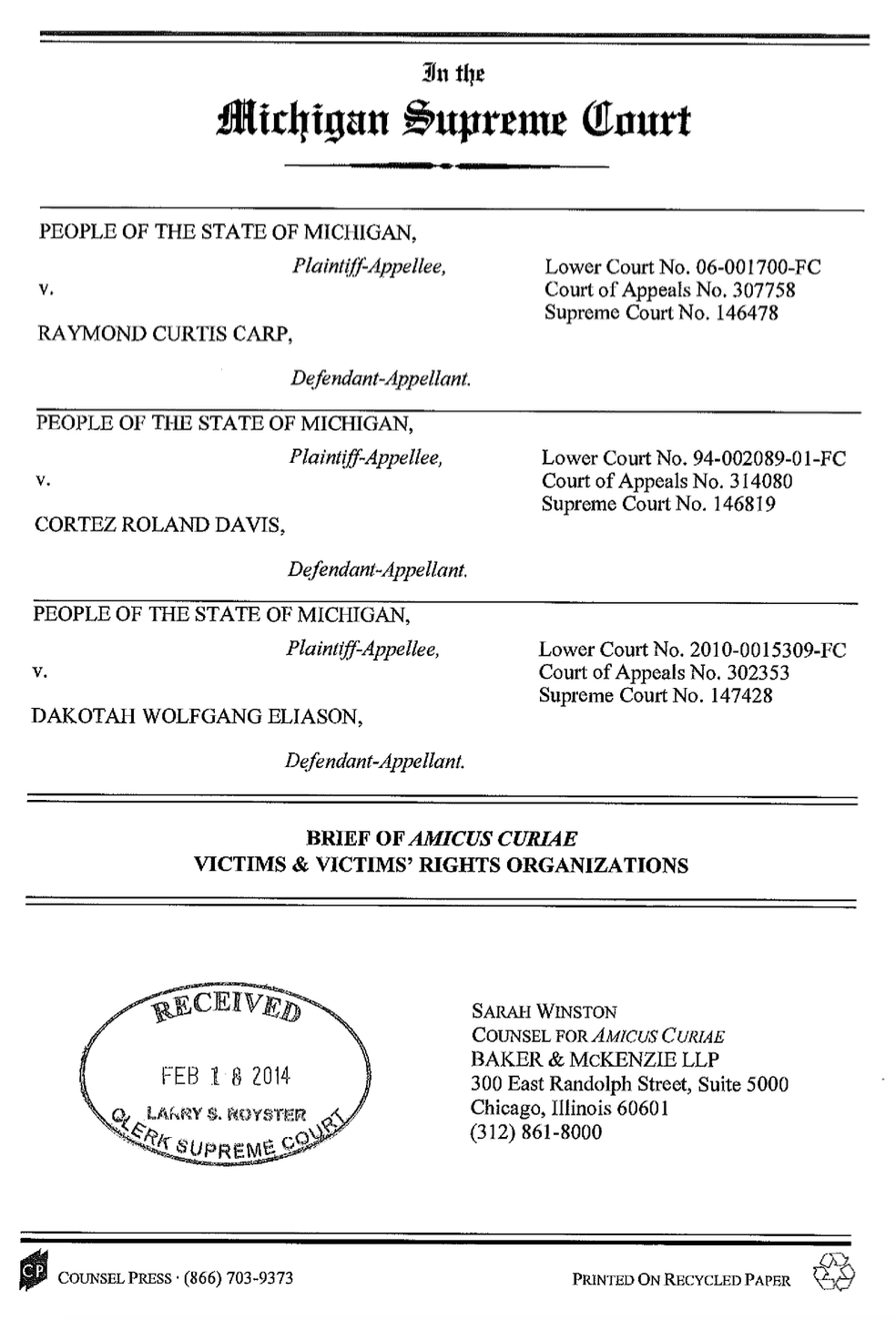
Summary of Argument
While our justice system assigns the ultimate duty of sentencing offenders to judges, theperspectives of victims and their families are a recognized and important part of the criminal trial proceedings. In examining what is just and fair for those youthful offenders convicted of homicide crimes in Michigan and resulting in mandatory life sentences without parole, amici urge this Court to similarly consider the perspective of these individual amici who, as victims and the family members of victims, have been directly and drastically affected by the crime. Amici are thus in a unique position to weigh and balance the fairness and equities of these tragedies and after due consideration, and urge the Court to apply Miller/Jackson retroactivelyand provide these youthful offenders the individualized sentencing that Miller requires. Amici fully understand that this will eliminate the mandatory life sentences without the possibility of parole, which have since been held to constitute cruel and excessive punishment. Furthermore, amici support providing an opportunity for individualized sentences that take youth and its attendant characteristics, including a unique capacity for rehabilitation, into account: "[Alpenalty may be cruel and unusual because it is excessive and serves no valid legislative purpose." Furman v. Georgia, 408 U.S. 238, 331 (1972) (Marshall, J., concurring).
Graham's "meaningful opportunity for release based on demonstrated maturity and rehabilitation," is not a guarantee of release to youth offenders; rather, it merely offers youth offenders a review and the opportunity to demonstrate that they are capable of making responsible decisions and that they do not pose a threat to society. A life sentence without possibility of parole, for a crime committed at fourteen, does not provide that opportunity. Thosesentenced prior to the Miller decision are deserving of this opportunity for review, because the mandatory sentencing imposed on these children failed to account for children's decreased culpability and increased capacity for reform. Whether they receive a second chance should not be measured—or delineated—by the date of their offense. The same immaturity and rashness that clouds a youth's mind in current times, muddled the minds of juvenile offenders that perpetrated the same actions twenty years ago.
Amici rebut any presumption that all murder victims' families share a common perspective and oppose the retroactive application of Miller/Jackson. Despite their devastating losses, amici believe that past juvenile offenders should be offered the opportunity to demonstrate that they have rehabilitated, matured, and deserve a second chance at life in thecommunity. Accordingly, amici support the application of Miller retroactively.
Miller/Jackson's prohibition of mandatory life without parole sentences for crimes committed by children converts the defendant's age at the time of the crime into an element of the underlying offense, rendering the Miller/Jackson rule substantive for retroactivity purposes. Because Michigan's sentencing laws cannot be applied against children post-Miller/Jackson without the consideration of a child's age and its consequences, Miller/Jackson therefore modifies Michigan's substantive law by narrowing its application for children. Moreover,Mississippi, Massachusetts, Illinois, Iowa, Florida, and Nebraska courts have all applied Miller/Jackson retroactively. See Jones v. State, 122 So. 3d 698 (Miss. 2013); People v. Williams, 982 N.E. 181 (Ill. App. Ct. 2012); Commonwealth v. Brown, 466 Mass. 676 (Mass. 2013); State v. Ragland, 836 N.W.2d 107 (Iowa 2013); Toye v. State, No. 2D12-5605, 2014 Fla. App. LEXIS 535 (Fla. Dist. Ct. App. 2d Dist. Jan. 22, 2014); State v. Castaneda, 287 Neb. 289,2014 Neb. LEXIS 14 (Neb. Feb 7, 2014).